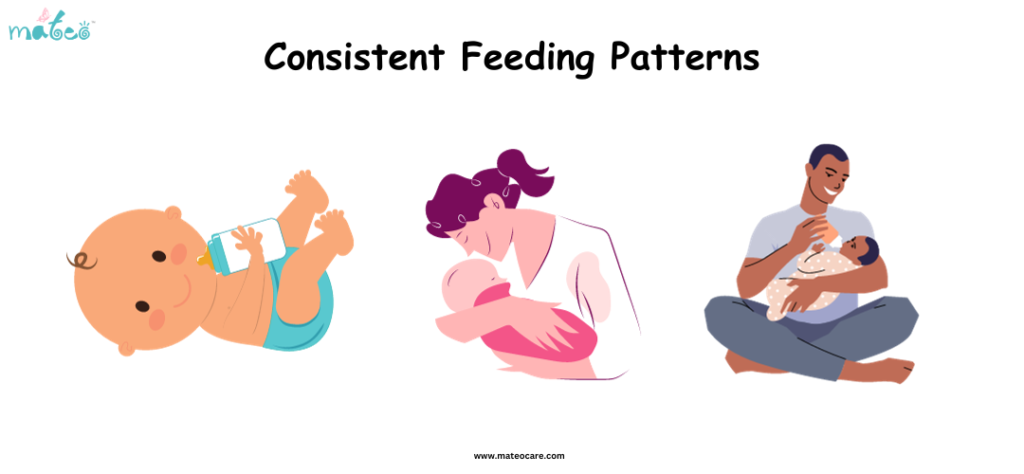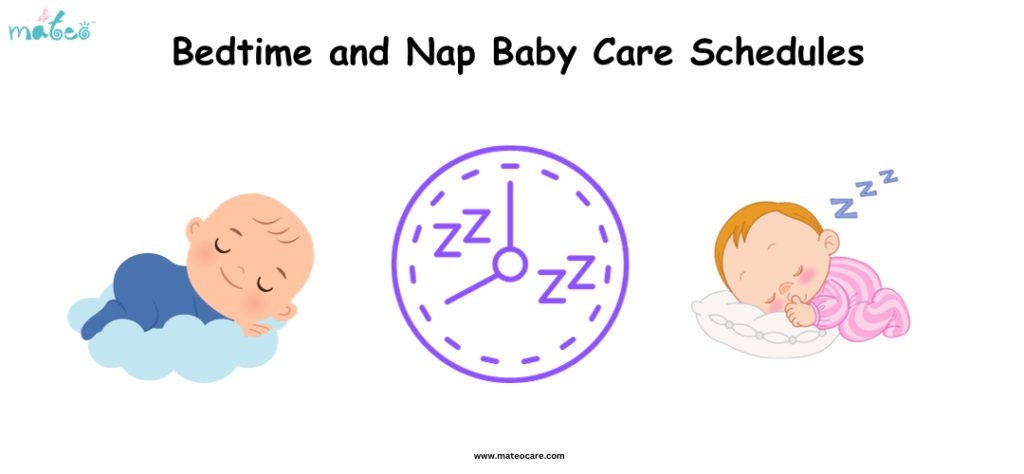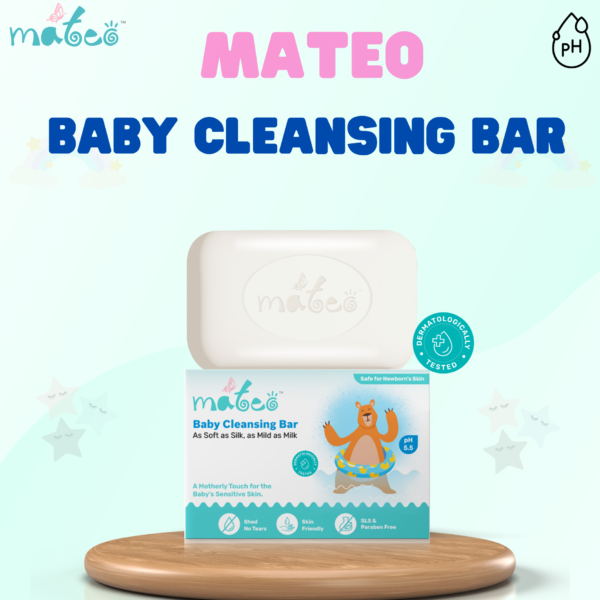
Morning to Night: Crafting a Baby Care Schedule That Works
Table of Contents
- 1. Consistent Feeding Patterns: Grounding the Day
- 2. Feed-Activity-Sleep cycles into Practice
- 3. Getting Around Wake Windows: A Juggling Operation
- 4. Taking in the Outdoors: Sunlight and Clean Air
- 5. Creating Bedtime and Nap Baby Care Schedules
- 6. Adopting a Regular Wake Time
- 7. Think about moving your bedtime earlier.
- Understanding Your Baby’s Unique Rhythms
- Daily Baby Skincare for Delicate Skin
- Navigating Imperfections with Grace
- FAQs
Establishing a schedule for the baby care process with a newborn may seem like a daunting task. After a hectic day of feeding, changing diapers, calming crying babies, and figuring out what signals to follow, new parents frequently long for some orders for the baby care process. Establishing a baby care schedule may provide you and your infant with a feeling of dependability throughout the day, even though a clock-based plan can seem like a far-off fantasy in the early months. As a former night nanny, I’ve gained some priceless knowledge that can help bring some order to the lovely chaos of the newborn stage.
1. Consistent Feeding Patterns: Grounding the Day

Setting regular feeding intervals, ideally every 2.5-3 hours during the day, can serve as the foundation of your newborn’s daily routine baby care. However, for nursing newborns or babies who have yet to attain their birth weight, a combination of planned meals and on-demand feeding may be more successful. Always get expert advice from your physician to ensure your baby’s dietary needs are satisfied.
2. Feed-Activity-Sleep cycles into Practice

It may be possible to avoid the negative correlation between eating and sleeping by promoting an active interval between feedings and naps. Simple tasks like changing your baby’s diaper with the best wipes or taking a leisurely stroll around the neighbourhood will help keep them awake and prevent them from falling asleep just at mealtimes.
3. Getting Around Wake Windows: A Juggling Operation

It is important to know how awake your infant can get between naps and nighttime. Your infant may sleep through 1.5 hours at most throughout the first 12 weeks of life. Following age-appropriate wake periods can help avoid overtired or underrated infants. Baby massage is one of the best ways to bond with your baby and relax them to get good sleep.
4. Taking in the Outdoors: Sunlight and Clean Air

Your infant will learn to discriminate between day and night with the help of indirect natural sunshine and the rejuvenating embrace of fresh air. Indeed, research indicates that babies who spend more time outside generally have better sleep patterns. Both the parents and the infant benefit from it!
5. Creating Bedtime and Nap Baby Care Schedules

Regular evening routines like taking a warm bath, changing into comfortable pyjamas, feeding, and turning off the lights might act as indicators that it’s time to settle down. Better sleep quality and fewer night awakenings are frequently correlated with this predictability. It can also be easier to indicate naptime without being overly stimulating if the naptime ritual is kept shorter, perhaps 5 to 10 minutes.
6. Adopting a Regular Wake Time
Waking your baby at the same time every morning and providing a meal within 15 minutes aids in the establishment of a regular wake-up pattern. This regularity helps to establish a rhythm for the remainder of the day, giving your infant a feeling of predictability.
7. Think about moving your bedtime earlier.
Transitioning to an earlier bedtime, ideally between 7:00-8:00 pm, about 6 weeks, may potentially improve your baby’s overall sleep quality. According to research, newborns sleep deeper and better quality earlier in the night, so taking advantage of this might promote more extended periods of relaxation.
Keep in mind that forming a routine is a step-by-step baby care process. One must make sure it conforms to one’s baby’s stage of development and lifestyle. In due course, your baby will get accustomed to this and develop confidence as a result of predictability. On the other hand, babies prefer a routine life yet being flexible also works in their favour. A set pattern may be momentarily interrupted by growth spurs, developmental milestones, and unplanned situations.
Understanding Your Baby’s Unique Rhythms
Following nature when it comes to feeding, sleeping, and playing is an excellent starting point to build upon one’s routine. Experts differ with one another about the best time to kick-start the process, but most agree that two to four months would be justifiable.
Reading Your Baby’s Nonverbal Cues
Your baby will be your first mentor. However, it is also time-consuming as well as demanding patience because detectable patterns will be perceived gradually. Such record-keeping on your part can do a lot in helping you figure out when to keep the baby in a programmed routine.
Embracing Adaptation with Growing Babies
Expect your baby’s routine to change as they grow. Their schedule will gradually change as they progress from less sleeping time to more playing time and finally, solid meals. Always flexible; sometimes things do not go exactly as the routine dictates, and this is okay.
Daily Baby Skincare for Delicate Skin
Including a soft skincare regimen in your baby’s daily care plan will protect his/her sensitive skin. Applying recommended lotions by paediatricians and changing diapers in time with the best wipes promote children’s skin health. These include something as simple as applying after-bath moisturiser or giving the soft baby massage in order to gently care for his/her delicate skin and ensure it maintains proper balance.
Mateo provides a complete collection of baby care products, and dermatologist-certified basics tailored for tender baby skin. These hypoallergenic baby lotions and shampoos enriched with natural substances feed the skin without irritating itchy skin. Mateo baby care products provide safe and effective alternatives such as fragrance-free baby washes, and tear-free formulations that ensure babies’ skin remains healthy and hydrated. These baby care products are pH 5.5 balanced. This would complement an environment of comfort and care that one strives to provide for a newborn by adding an extra layer to healthy skin development.
Navigating Imperfections with Grace
Although constancy is priceless, diversity is unavoidable when it comes to parenting. At times, your baby may choose to forgo a nap, opt for additional snacks or rise earlier than anticipated. Your baby’s days will be disrupted by such vacations, older siblings and other social commitments or errands that life throws at you. Accepting these ups and downs with your infant’s provision of enough care, rest, sufficient food and affection will enable him/her to grow up healthy.
The routine should embrace everything from feeding the infant to gentle skincare to foster healthily tender skin. Love this process, understanding that every day has its feeding and scanning changes. Soon, you and your baby will be able to adjust to your own rhythms, which will suit your family’s way of life.
FAQs:
1. What should be my feeding routine for my baby?
A feeding routine incorporating specific feeding time intervals of approximately 2.5 – 3 hours throughout the day should be established. Nevertheless, combined schedule-and-on-demand feed is better suitable for breastfeeds and preterm infants who do not weigh at birth. You should make it a point always to seek guidance from your paediatrician to make sure that your baby gets sufficient nutrition.
2. Why should I be aware of my baby’s wake windows?
Knowing when your baby is awake during the day and at bedtime is important. This means that in the first twelve weeks, the longest period when your baby can stay awake is about an hour and a half. The baby’s sleep patterns are likely impacted by adherence to the age-appropriate wake windows.
3. What skincare routine would be most soothing for my baby?
A kind of mild skincare regime should be followed. It includes changing the baby’s diapers at once to avoid contact dermatitis. The practice of after-bath moisturization and gentle baby massage provides a soothing touch caring for your child’s soft delicate skin and leaving his skin healthy. For instance, items such as those offered by Mateo are made for sensitive baby skin, ensuring a nutritious supply with the level of proper moisturising.

Nivethitha Sridharan
Nivethitha is a mother of two children and has a great interest in writing as an experienced mother. She publishes educational and interesting articles on baby care and also assists parents in selecting the finest baby products for their baby’s skin and well-being. She focuses on infant skin care and health issues. She also provides suggestions and guidance on baby care and avoids common skin disorders in newborns. Nivethitha likes studying and writing about new and innovative ideas that might assist people in finding solutions to their problems. She feels that content writing is an effective means of communicating thoughts and information to the world.
-
Mateo All in One Pack
Add to basket₹1,700.00 -
Mateo Baby Body Wash – 200 ml (Pack of 2)
Add to basket₹790.00 -
Mateo Baby Care Collection – Mateo Baby Massage Oil(100ml), Mateo Baby cleansing bar(75gm), Mateo Baby Shampoo(200ml)
Add to basket₹775.00 -
Mateo Baby Care Collection – Mateo Baby Moisturizing Lotion(200ml), Baby Cleansing Bar(75gm), Baby Shampoo(200ml)
Add to basket₹930.00 -
Mateo Baby Care Collection – Mateo Baby Moisturizing Lotion(200ml), Mateo Baby Body Wash(200ml), and Mateo Baby Rashfree Cream(60gm)
Add to basket₹925.00 -
Mateo Baby Care Collection – Mateo Moisturising Lotion(200ml)+ Mateo Baby Rashfree Cream(60g) + Mateo Baby Massage Oil(100ml)
Add to basket₹725.00 -
Mateo Baby Care Collection-Mateo Baby Body Wash(2ooml), Baby Rashfree Cream(60gm), Baby Massage Oil(100ml)
Add to basket₹770.00 -
Mateo Baby Care Collection-Mateo baby moisturizing lotion(200ml), Baby cleansing bar(75gm), Baby massage Oil(100ml)
Add to basket₹730.00









